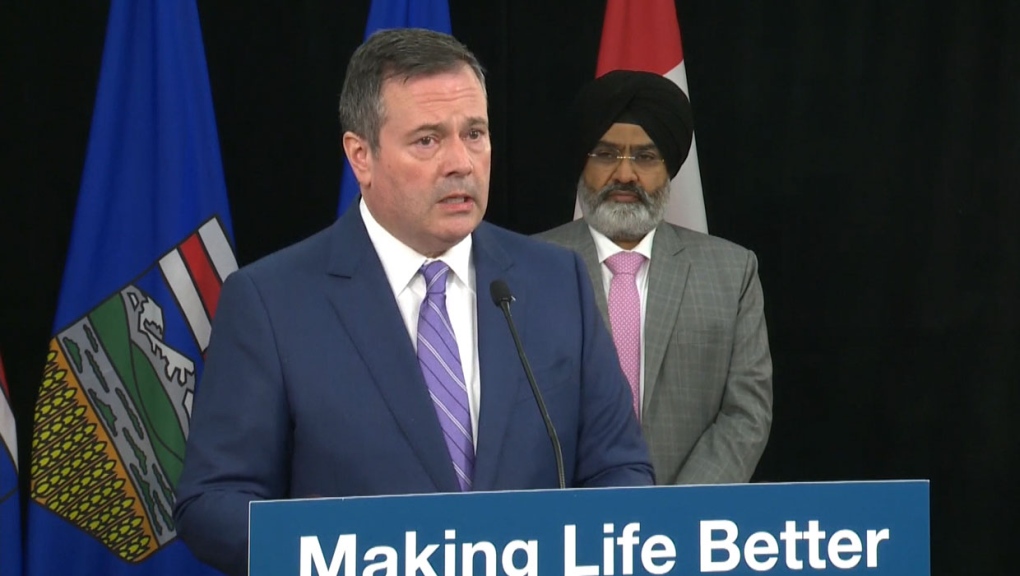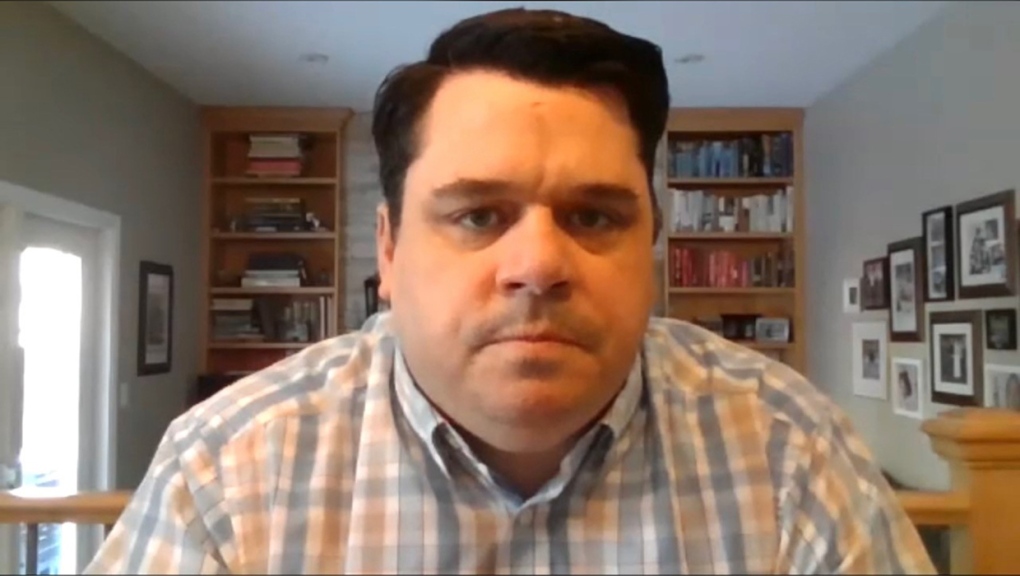Past the peak? Alberta experts cautiously optimistic as Omicron variant begins downward trend
Alberta’s health-care system remains under extensive strain with more people in hospital than at any previous time during the pandemic, but signs from wastewater analysts suggest the province is slowly beginning to surpass the peak of COVID-19 infections.
In Calgary, analysts tested wastewater through PCR signals and noticed in late December that the intensity of the virus spiked four to five times higher than the previous Delta variant.
Casey Hubert, research chair in geomicrobiology at the University of Calgary, said that since Jan. 11, those numbers have slowly trended downward.
“What we're looking for now is to see the PCR signal dropping over a successive number of days so if that trend continues, we will be able to predict even better if this virus is in fact slowing its spread,” Hubert said.
"We know with wastewater that we're catching everyone, and that's what's really valuable about it," Hubert added. "What we saw earlier in the pandemic is that wastewater testing correlated with clinical cases about one week in advance so what that means is that wastewater can provide an early warning signal about which way we're headed with COVID-19.”
Hubert noted that cases of COVID-19 are declining in 15 of 19 Alberta communities, including significant declines in the major hubs of Calgary and Edmonton.
ALBERTA NOT FOLLOWING ONTARIO REOPENING: KENNEY
On Thursday, Premier Jason Kenney announced Alberta will not follow suit with Ontario in reopening, noting that pressure on the health-care system is still expected to increase in the coming days.
However, he did say that Alberta could soon see a reprieve in case numbers.
“If the (Omicron) variant performs in Alberta like it has in jurisdictions all around the world, we can reasonably expect that we may now be beginning on the downslope of transmissions,” he said.
 With a UCP leadership review vote days away, a new poll shows Alberta Premier Jason Kenney stuck around 30 per cent
With a UCP leadership review vote days away, a new poll shows Alberta Premier Jason Kenney stuck around 30 per cent
“When do all these restrictions end? My answer is hopefully soon, but we have to get past Omicron. We’ve not yet reached the peak of hospitalizations; we have to support our health-care workers."
Kenney added that positivity rates are beginning to drop. On Thursday, the rate of positivity sat at 33 per cent, down from 41 per cent just one week prior.
Alberta also increased its hospital bed capacity, which included 18 additional beds set to open in the response unit in Edmonton and another 12 in Calgary’s South Health Campus starting Jan. 24.
The province reported 3,527 new infections and 264 more hospital admissions, raising the total number of patients receiving care to 1,131 — including 108 in intensive care. That marks the third-highest number of patients in hospital to date.
Eight more deaths were reported on Thursday, pushing the pandemic total to 3,421
HOSPITAL SYSTEM REMAINS A CHALLENGE
Infectious disease expert at the University of Calgary, Dr. Craig Jenne says the recent wastewater analysis is a positive data point in showing that the rapid expansion of the COVID-19 virus has stopped, but more encouraging data is still needed.
 University of Calgary's Craig Jenne infectious disease expert said the low vaccine rate among 20 to 29-year-olds could be a concern when school goes back to class in the fall
University of Calgary's Craig Jenne infectious disease expert said the low vaccine rate among 20 to 29-year-olds could be a concern when school goes back to class in the fall
He says Alberta can safely say it’s hit the peak only once the downward trend continues for several more days or a few more weeks.
“I think that that's one thing that we have seen throughout the pandemic is this time disconnect between the peak of new cases and peak of hospitalizations as hospitalizations always follow two to three weeks after the peak of infections,” Jenne said.
“So when we pass this peak and we start the downward side of new infections, unfortunately hospitalizations will continue to rise for a period of time.”
Jenne also noted that one of the only true ways to see a solid decline is to increase the number of Albertans receiving booster shots.
“People that are fully-vaccinated and boosted are at significantly lower risk when we compare them to age matched and health condition matched non-vaccinated patients requiring hospitalization or requiring ICU admission,” he said.
“Depending on the age group, sometimes this is approaching 20 times less at risk.”
Disease specialist with the University of Alberta, Dr. Lynora Saxinger agrees that hospitalizations will increase according to past trends, including a further burden on health-care workers.
 Dr. Lynora Saxinger
Dr. Lynora Saxinger
"And again, on the way down, there's just as many cases so we would be anticipating really significant challenges in the health-care system for the next several weeks and we're already I think, struggling and having to open new spaces and having difficulty with staffing,” she said.
“The staff are under a lot of stress already so I can't say that this is looking to be a great time and weeks ahead.”
To help ease staffing pressures, 610 nursing students will join Alberta Health Services to help provide pandemic care. The students will be supervised by trained nurses and receive educational credit.
LAW PROFESSOR: MESSAGING FROM PROVINCE WILL INFLUENCE HUMAN BEHAVIOUR
University of Calgary law professor Lorian Hardcastle notes that messaging from Premier Kenney and the province has been "watered down" and should stress the importance of taking a more proactive approach to slow spread of the virus.
“The government had time to do more to make schools safe in that week that the children were delayed and coming back and certainly there have been a lot of disputes around school ventilation,” Hardcastle said.
“I think as well, we had less supply of rapid tests, for example, to give children in schools than in other provinces, because we had used so many of our rapid tests in the private sector.”
Hardcastle noted that Kenney will need to be careful in what he says to the public so that others may not be encouraged to take less precautions that they otherwise might take.
For example, she noted that AHS workers were prepared to deal with the vaccine mandate and not to exempt worksites, but had received a directive from the Ministry of Health to exempt particular sites.
“So these measures were the AHS vaccine mandate hasn't been strictly enforced, have really been driven by the government rather than rather than AHS itself,” Hardcastle said.
“It’s not clear if those workers were truly needed back to keep the healthcare system going or whether there are political undercurrents around the premier and some of his caucus or constituents who are unvaccinated.”
CTVNews.ca Top Stories

Firefighters battle to control devastating Los Angeles wildfires as ferocious winds calm somewhat
A fast-moving fire broke out in the Hollywood Hills on Wednesday night, threatening one of Los Angeles' most iconic spots as firefighters battled to get under control three other major blazes that killed five people, put 130,000 people under evacuation orders and ravaged communities from the Pacific Coast to inland Pasadena.
Canada could impose tariffs on U.S. steel, orange juice in response to Trump threat
Canadian officials are narrowing a list of American products to target in the event the federal government must respond to U.S. tariffs on Canadian goods, CTV News has confirmed.
'True when I said it, true today': former Canadian PM Harper pushes back against Trump on social media
Former prime minister Stephen Harper doesn’t find U.S. president-elect Donald Trump’s jibes about Canada becoming the 51st U.S. state very amusing.
Can the U.S. really make Canada the 51st state?
Talk of Canada becoming the 51st American state has raised an existential question on this side of the border: Could it be done? Could the maple leaf make way to the stars and stripes? According to several experts, it may be possible, but not painless.
NEW Tipping guide to Canada: When, where and how much to tip for restaurants, taxis and more
CTVNews.ca has created an entirely unofficial guide to tipping in Canada to help visitors, newcomers and curious Canadians navigate the shifting social norms of when, where and how much to tip.
'On the front line': Quebec planes and B.C. helicopters battle L.A. wildfires
Water-bombing pilots and crews from Quebec and a British Columbia company have been grappling with high winds and heavy turbulence in the battle against massive Los Angeles wildfires, as Canadians with homes in the area are forced to flee fast-moving flames.
Canadians want Ottawa and provinces to team up against Trump tariff threats: Nanos survey
A majority of Canadians want Ottawa and the provinces to team up against U.S. tariff threats, according to a new survey by Nanos Research.
Convicted Jan. 6 rioter arrested as fugitive in Whistler, B.C.
An American citizen convicted of participating in the Jan. 6, 2021, riot on Capitol Hill who said he was seeking asylum in Canada has been arrested as a "fugitive from U.S. justice," according to authorities.
Overdose deaths in Ontario increasingly involve more than one drug, new report says
An increasing number of overdose deaths in Ontario involves the use of more than one drug, with the combination of opioids and stimulants proving to be especially dangerous, a new report says.
































